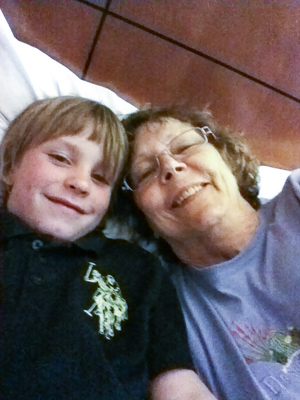|
|
|
|
|
October 5, 2012
Dear Julia,
We here at Chambers Wald, LLP hope you are having a fine autumn; we are.  As the leaves out my window turn shades of red, I am reminded that summer is over, though the weather is still pleasant here in Marin. There is the slowing down of the fall season, the withering of leaves and grasses, the fading of flowers; a general hunkering down. People, too, experience life's autumn. For some it is a time of wisdom, spiritual growth, a time for new interests and old ones. But for others with the slow down of aging comes mistreatment, abuse, isolation and outright theft. I want to help you recognize when an elder you know may need protection from such treatment. I want to talk about elder financial abuse. |
|
|
|
|
Elder Financial Abuse
 First you need to know that elder financial abuse most often is inflicted on the most vulnerable of folk, people whom the court would find incapacitated. So, if there is a question in your mind about whether your Aunt Jane is being mistreated, you might start by asking: - Is she mentally able to make financial decisions?
- Is she unduly influenced for the worse by someone she trusts?
This test is summarized by the expression "subject to undue influence"; it is the existence of undue influence that I most want you to know about.
|
The Evaluation Process
A. In your conversation with an elderly person, how can you tell if someone is being unduly influenced by another (i.e. caretaker, spouse or family member) to the elder person's disadvantage.
 In your conversation be sure to look for signs that things that are not okay. Listen with your ears, but also look. You are watching for looks and behaviors that show that the elder is unduly subservient to the caretaker or "friend" whom you suspect exercises undue influence. If you suspect undue influence, then watch: Watch the caretaker's body language and demeanor as he interacts with your elder and with you. Figure out what you can learn from his demeanor. Watch the elder's demeanor and try to figure out his relationship with his caretaker or the person who has aroused your suspicion. The fact that the elderly person needs help with finances may not signal incapacity. He may need someone to pay the bills and make deposits and balance the checkbook because it has become hard or because it is too time consuming or because his eyesight is dim.  Even busy professionals have been known to hire professionals to do these task or to get a spouse or partner to do them. B. An elder's degree of dependence is highly determinative of whether he may be subject to undue influence.
- by "dependent" I mean relying on other people for a variety of things - be they physical, emotional or financial. As we grow older our ability to be independent changes and we can then become at risk for manipulation by outside influences.
Here are two situations, only one involves undue influence:
- An elder can be dependent on her son for many things - physically, emotionally and financially and ALL IS WELL.
You can tell if all is probably okay if the son accepts support and help for his mother: e.g, if the mother is hospitalized, he lets others take care of her; if it is easy for friends and family to contact the mother by phone or visiting; if the son is willing to have a third party pay the bills and balance the checkbook. - An elder is dependent on son and assumes that the son has his best interests at heart when indeed he does not. He may be taking advantage of his parent in many different ways. Keep reading:
|
C. Signs to Look for When Elder Abuse is Occurring
First, the elder is in a state of dependency along one or more of these lines: - Mobility impaired - she cannot drive or even walk easily;
- He cannot make his own meals or even purchase the food;
- She cannot "keep house";
- She cannot see or hear well which makes it hard to be in the world;
- His friends have died, and his family is not near by; she lives alone and no one is watching out for her.
This sets up a situation where if someone is so inclined they can take over the will of the elder. This situation may lead to financial elder abuse because the elder feels he is dependent on the caretaker/abuser so he must please the caretaker or risk reprisal. He then does whatever he is told to do. He is dependent for:
- staying alive
- food
- some socialization
- all kinds of help with things the elder can no longer do for himself
 The caretaker increases the dependency - that is, the caretaker reinforces the elder's belief she can only look to the caretaker for help. The caretaker/abuser almost certainly will:
- Badmouth others - e.g. children or other possible helpers, saying "He's going to put you in a nursing home" (or whatever the elder's worst fear is). This makes the elder fear the other possible helpers, which leads to further isolation and makes it harder for the elder to ask for help from anyone but the abuser.
- Take actions with the intention of isolating the elder. The abuser most likely:
- Turns off the elder's cell phone or removes it
- Makes the land line phone inaccessible
- Turns away visitors and doesn't tell the elder that she had visitors
- If someone calls, says the elder is sleeping, or in the shower, or indisposed or doesn't want to talk to them
 The message delivered to the elder: "I wonder why X doesn't call. I told you X doesn't care about you - only I care about you." Like a dependent child the elder then obeys his abuser (which was the point).
- The elder gives him money
- Changes beneficiary on life insurance or annuity
- Deeds the house
- Buys life insurance with abuser as beneficiary
- Changes will or trust to favor abuser
HERE IS THE ELDER FINANCIAL ABUSE. A SIMPLER TERM IS THEFT. Just because the elder appears to have "given" the asset to the caretaker, is no indication that there was no abuse. |
It Isn't Just About the Money  Now here is the point that is not often emphasized in discussions of financial elder abuse. While the result of the scenario painted above is seen as a case of financial elder abuse, obviously there is also emotional and psychological damage done. For instance the elder feels pain at the loss of the other family members who, as far as she knows, no longer call or come by; this can cause profound grief tailing off to depression.  Fear predominates. Feeling dependent is not a good feeling under most circumstances, but being dependent on someone who is not nice sets up real fear. This fear is coupled with the fear that the other son will "put me in a nursing home" and the threat that if you don't do what I say, you will be all alone. Emotional elder abuse almost always accompanies financial elder abuse. It is an even greater wrong than the theft. So a red flag is that Uncle Tommy is so much sadder and soft spoken than he used to be. He won't meet your eyes and never ever laughs anymore. You wonder what is going on and how you can help. If you know someone in this situation and are impelled to try to help (and how could you not be), call us at Chambers Wald, LLP (415.482.7555). We can talk to you about your fears, ways to evaluate the situation, and ways to help your elderly loved one.
|

Here's to a Healthy Autumn
I hope your fall season is filled with warm golden days, love, and contentment. Julia P. Wald
Chambers Wald, LLP
415.482.7555
|
|
|
|
|
|
|
|
|
|
|